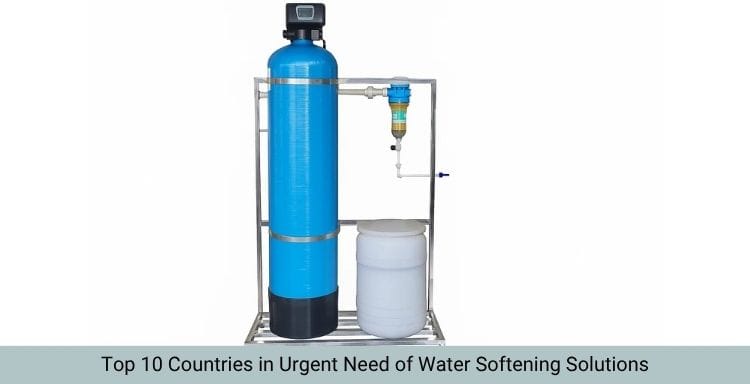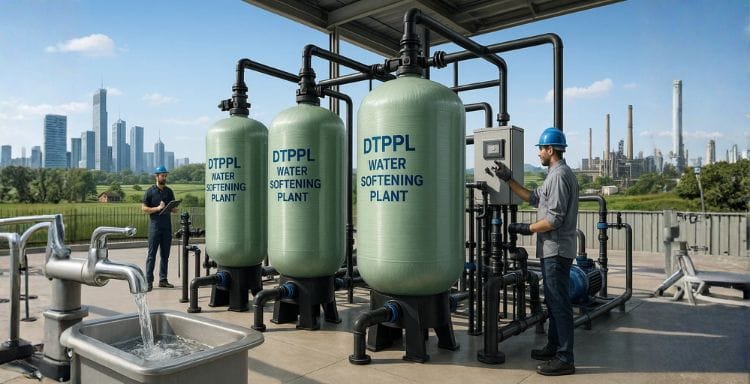
Table of Contents
Top 10 Countries in Critical Need of Water Softening Plants
October 17, 2025
Water softening plants play a critical role in tackling water hardness, which has a significant impact on various sectors, including industrial, residential, and commercial sectors. Hard water contains high levels of calcium, magnesium, and other minerals that can cause scaling, clog pipes, damage equipment, and reduce the efficiency of appliances. In this article, we will explore the top 10 countries where water softening plants are urgently needed and why these regions are facing critical challenges related to hard water.
India
Hard Water Prevalence: India is home to one of the highest percentages of households dealing with hard water issues. Approximately 85% of households in India experience hard water, with regions like Maharashtra, Gujarat, and Rajasthan being particularly affected. This widespread issue is mainly due to the high mineral content in water sources such as groundwater, which makes it unfit for daily use without treatment.
Critical Issues:
- Industrial Impact: Key industries such as textiles, food processing, and beverage manufacturing face significant scaling problems in boilers, cooling systems, and industrial equipment. The scale build-up leads to frequent maintenance, equipment failure, and higher operational costs.
- Domestic Use: Hard water causes scale build-up in household appliances like geysers, water heaters, washing machines, and dishwashers, which reduces their lifespan and efficiency.
Market Demand:
With urbanization and industrial growth, the demand for water softening systems is increasing in India. The market for water treatment solutions is expanding rapidly as people become more aware of the harmful effects of hard water on health, household appliances, and industrial operations.
China
Hard Water Areas:
Regions like Shandong, Hebei, and Henan report high levels of water hardness due to the high mineral content in groundwater. The industrialization in these regions further exacerbates the problem.
Critical Issues:
- Industrial Sector: China’s manufacturing industry, especially electronics, textiles, and power generation, heavily relies on softened water to prevent scaling in boilers and other equipment. The accumulation of scale leads to decreased efficiency and increased maintenance costs for machinery and boilers.
- Infrastructure Development: With rapid industrial growth and infrastructure development, demand for water softening systems in both residential and industrial sectors is rising.
Market Growth:
China leads the Asia-Pacific region in water softener market share, driven by the needs of its industrial sector and growing infrastructure demands.

United States
Hard Water Regions:
Areas like the Midwest, Southwest, and parts of the Northeast face widespread hard water issues due to high levels of calcium and magnesium in the water supply.
Critical Issues:
- Industrial Applications: The power generation, food processing, and manufacturing industries require softened water to ensure the smooth functioning of equipment. Scale build-up in boilers, cooling systems, and pipes can reduce energy efficiency and increase the cost of maintenance.
- Residential Impact: Households dealing with hard water face problems like soap scum, limescale deposits, and clogged pipes. This leads to higher energy consumption and increased costs for appliance repairs and replacements.
Market Size:
The U.S. holds a significant share of the global water softening systems market. The demand is driven by the need to protect industrial machinery, reduce water wastage, and improve appliance efficiency.
Read Our Article: All About Water Softening Plant
Germany
Hard Water Zones:
Regions like Bavaria and Baden-Württemberg in Germany experience high levels of water hardness, which is common in many parts of Europe.
Critical Issues:
- Industrial Need: Germany’s strong industrial sector, including chemicals, automotive, and manufacturing, faces significant scaling issues in machinery and pipelines. Softened water is essential to maintain efficiency, prevent damage, and reduce operational costs.
- Environmental Concerns: Industrial sectors in Germany also emphasize the environmental benefits of using soft water to reduce chemical usage for cleaning and maintenance.
Market Demand:
The demand for water softeners in Germany is high due to the significant need in the industrial sector, as well as growing awareness of the economic and environmental advantages of water softening technologies.
Saudi Arabia
Water Quality Challenges:
Saudi Arabia, heavily reliant on desalinated water, faces challenges with hard water due to the high mineral content of desalinated water. This results in significant scaling in pipes and industrial equipment.
Critical Issues:
- Industrial Sector: The petrochemical and power generation industries require softened water to prevent scaling in boilers, cooling systems, and heat exchangers. Without softening, these systems would face frequent breakdowns and costly repairs.
- Water Treatment Requirements: With the increasing adoption of desalinated water for domestic and industrial use, the country’s water treatment infrastructure needs to address the high mineral content to protect both industrial processes and household appliances.
Market Growth:
As water scarcity and industrialization continue to increase, Saudi Arabia’s adoption of water softening systems is rapidly growing to meet both domestic and industrial needs.
Read Our Article: 5 Key Factors to Consider While Choosing a Water Softening System
Mexico
Hard Water Issues:
Cities like Monterrey and Guadalajara face significant hard water problems due to the reliance on groundwater, which is rich in minerals.
Critical Issues:
- Industrial Impact: Hard water creates scaling issues in electronics, beverage manufacturing, and other industries, leading to inefficiencies and costly maintenance.
- Urban Water Management: As Mexico’s urban centers grow, addressing water hardness through softening systems is crucial to ensure smooth water management and the protection of domestic and industrial infrastructure.
Water Management Needs:
Urban water management systems must adopt water softening technologies to ensure safe and efficient water distribution for both households and industries.
Thailand
Water Quality Concerns:
A significant portion of Thailand’s water is unsuitable for human consumption, primarily due to high hardness levels.
Critical Issues:
- Industrial Demand: Thailand’s industrial sector, including electronics, textiles, and food processing, requires softened water to maintain machinery and avoid scaling in equipment.
- Water Stress: With limited water resources, water treatment technologies like softening are essential to maximize water use and ensure its quality.
Water Stress:
Water stress is another key concern in Thailand, making water treatment solutions—including softening systems—vital for both industrial and residential water quality management.
Brazil
Hard Water Regions:
Certain areas in Brazil experience high levels of water hardness due to their natural water sources, particularly in the Southeast and Northeast regions.
Critical Issues:
- Industrial Needs: Industries like textiles, food processing, and beverages require softened water to prevent scaling in machinery, improve product quality, and reduce maintenance costs.
- Urbanization: The growing urban population in Brazil is increasing the demand for treated water, including softened water, to ensure access to clean and efficient water supplies.
Market Potential:
The water softener market is growing in Brazil, with the demand driven by industrial growth, urbanization, and the need for improved water management solutions.
South Africa
Water Quality Issues:
Urban and industrial areas in South Africa face hard water challenges due to mineral-heavy water sources, particularly in regions like Johannesburg and Cape Town.
Critical Issues:
- Industrial Applications: South African industries, especially mining and manufacturing, require softened water to prevent scaling in equipment, reduce operational costs, and ensure smoother production processes.
- Water Availability: With increasing water scarcity, South Africa must implement water softening technologies to ensure efficient water use and reduce waste.
Market Demand:
There is a growing demand for water softening systems in South Africa, driven by both industrial needs and the necessity for clean, accessible water in urban areas.
United Kingdom
Hard Water Zones:
Regions like the Midlands and the South East of England experience hard water problems due to high levels of calcium and magnesium.
Critical Issues:
- Industrial Impact: Industries such as brewing and food processing face scaling problems in equipment, which can reduce production efficiency and increase maintenance costs.
- Domestic Use: Households with hard water face issues like limescale build-up, leading to inefficiency in appliances and increased energy consumption.
Market Trends:
As awareness of the long-term costs associated with hard water grows, demand for water softening systems in the UK is expected to continue increasing.
How DTPPL’s Water Softening Plants Can Be the Best Solution for All the Above Countries’ Needs
Dharmanandan Techno Projects Pvt. Ltd. (DTPPL), a leader in providing innovative water treatment solutions, can offer tailored water softening plants to address the critical needs of countries facing water hardness issues, as outlined in the previous sections. With its extensive expertise in water treatment technologies, DTPPL can provide robust and cost-effective solutions to industries and residential areas that need high-quality soft water. Here’s how DTPPL’s water softening plants can be the best solution for the countries mentioned:
Custom-Made Water Softening Systems
DTPPL offers custom-designed water softening systems that can be adapted to the specific water hardness levels in different countries. Whether it’s for residential, commercial, or industrial purposes, DTPPL ensures that each system is optimized for the local water conditions, ensuring maximum efficiency.
Industrial Water Treatment
In countries like India, China, and Brazil, where industrial operations suffer from scaling in boilers, cooling systems, and production equipment, DTPPL provides advanced softening plants designed to handle large-scale industrial needs. DTPPL’s systems help prevent scale accumulation, thus reducing the wear and tear on equipment, minimizing downtime, and enhancing operational efficiency.
Cost-Effective Solutions for High Water Demand
Countries such as South Africa, Saudi Arabia, and Thailand, which face increasing water scarcity, benefit from DTPPL’s energy-efficient and water-conserving solutions. DTPPL’s water softening plants help reduce water wastage, optimize water usage, and improve water quality, all while maintaining cost-effectiveness.
Long-Term Durability
DTPPL’s softening plants are built to last. With high-quality materials and advanced technology, these plants are designed for long-term use, reducing the need for frequent repairs or replacements. This is crucial for countries like Mexico and Germany, where industries rely heavily on uninterrupted water supply for manufacturing.
Easy Integration into Existing Infrastructure
DTPPL ensures that their water softening plants are easy to integrate into existing water treatment or industrial setups. Whether it’s in residential complexes or large-scale industrial facilities in China or the U.S., DTPPL’s systems can be seamlessly incorporated into the current infrastructure, ensuring minimal disruption during installation.
Eco-Friendly and Sustainable Solutions
As environmental concerns grow globally, especially in regions like Germany and Saudi Arabia, DTPPL’s water softening plants focus on eco-friendly practices. These systems are designed to consume less energy, minimize waste, and reduce the environmental impact of water treatment processes.
Continuous Support and Consultation
DTPPL offers continuous consultation and support to help clients understand the best practices for maintaining water quality, particularly in countries facing severe water quality issues. Whether it’s for urban water management in Mexico or industrial water treatment in South Africa, DTPPL provides valuable guidance and ongoing service.
Scalability for Growing Markets
In countries with growing industrial sectors like India, China, and Brazil, DTPPL’s water softening plants are highly scalable, which means they can grow with the needs of the market. As demand for clean, softened water increases, DTPPL’s solutions can be expanded without the need for a complete overhaul of the existing system.
Cost-Effective Maintenance
With high operational efficiency and easy-to-manage systems, DTPPL’s softening plants require minimal maintenance, which reduces long-term costs for countries like the United States and United Kingdom, where industries and households face the constant need to maintain equipment affected by hard water.
Tailored Solutions for Each Country’s Specific Needs
Each country mentioned has unique water hardness issues. DTPPL’s water softening plants are tailored specifically to address these unique needs, whether it’s high mineral content in desalinated water in Saudi Arabia or the high calcium content in groundwater in China.
Conclusion
Water softening plants are urgently needed in many countries around the world, particularly in regions facing significant water hardness issues. Countries like India, China, and Saudi Arabia are particularly in need due to their industrial growth, water quality challenges, and high demand for reliable water management solutions. By addressing the issues of hard water through softening technologies, these nations can protect their industries, improve water quality, and reduce the economic impact of scale-related damage.
DTPPL’s water softening plants are the ultimate solution for countries facing the challenges of hard water, whether it’s for industrial applications, urban water supply, or residential needs. With customized solutions, eco-friendly designs, and continuous support, DTPPL provides the best-in-class technology to help countries like India, China, Mexico, and others overcome their critical water softening challenges efficiently and cost-effectively.
About Author

Director – Global Marketing and Sales
Mr. Bhavesh from Dharmanandan Techno Projects Pvt. Ltd. has played a pivotal role in elevating the DTPPL brand to the global stage, leveraging his exceptional expertise in marketing and communications. He is committed to helping clients achieve significant growth while strengthening their own brands. Dharmanandan Techno Projects Pvt. Ltd. is a leading manufacturer and supplier of water purification systems and turnkey solutions for mineral water plants. With years of experience in designing and delivering high-quality water treatment solutions, the company provides end-to-end services, including system design, installation, maintenance, and ongoing support. Specializing in scalable and customizable water plants, DTPPL has successfully served industries worldwide, ensuring clean and safe drinking water across diverse applications.




